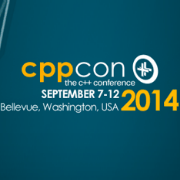Cinder 0.8.6 released
 In case you missed it:
In case you missed it:
Cinder 0.8.6 Released
The award-winning C++ graphics library Cinder has been updated with support for:
- New audio API
- WinRT and DirectX 11 support
- Unicode APIs for UTF-16 and UTF-32 strings
- Path2d extensions for calculating tangents and Bezier optimizations
- New events for foregrounding/backgrounding apps
- And more

 Recently on the Spot blog:
Recently on the Spot blog: In case you missed it:
In case you missed it: The
The